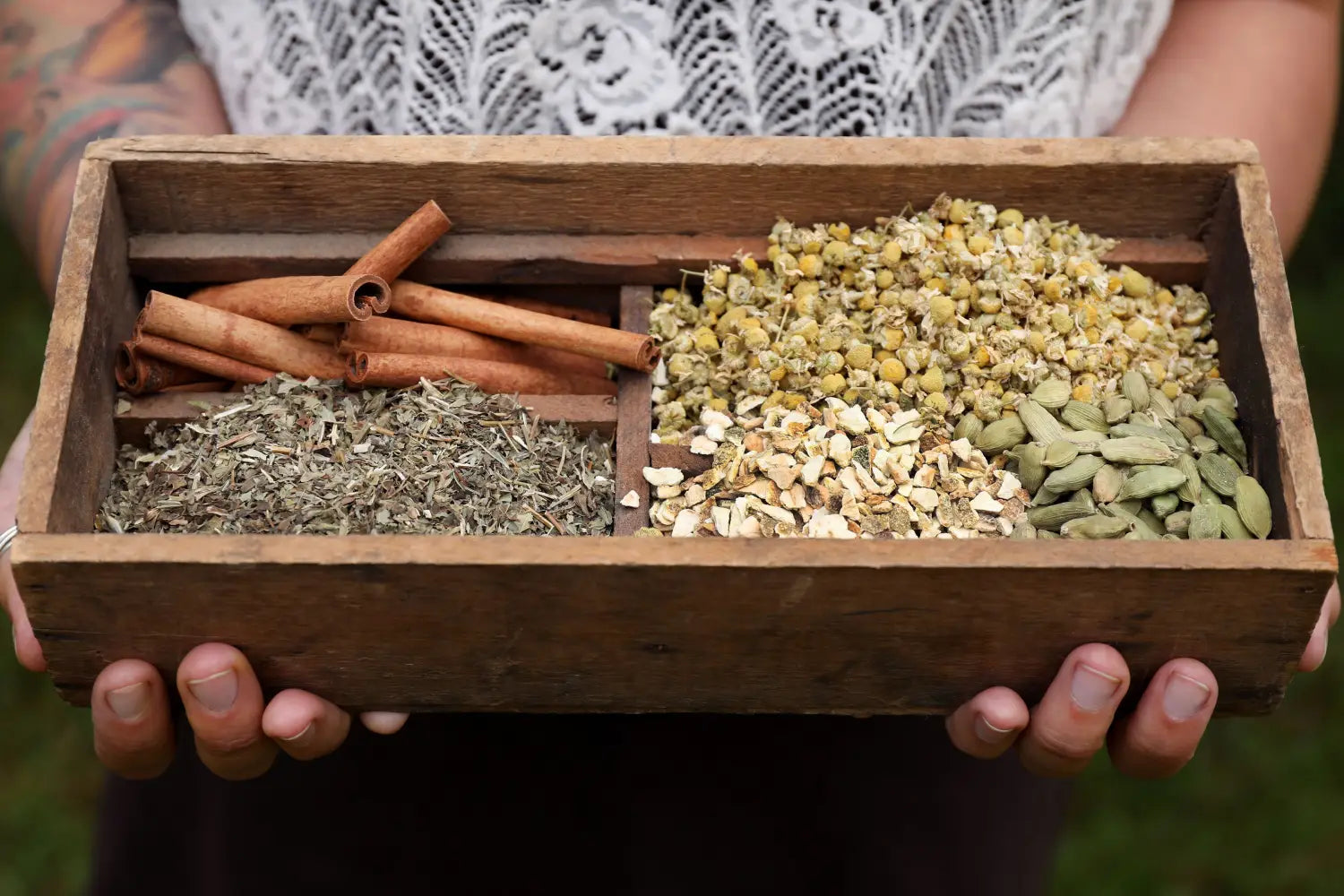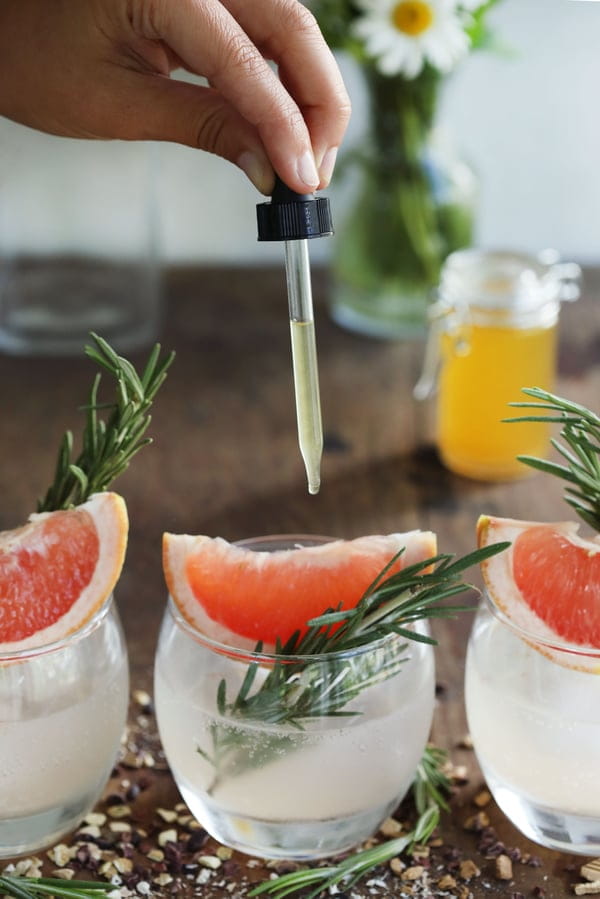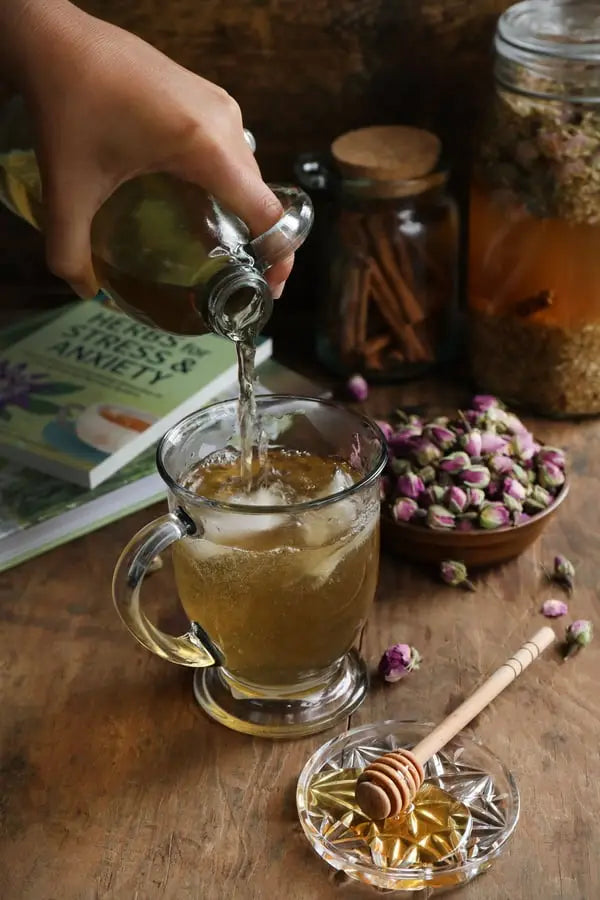Restoring Digestive Health After Vacation
Best Herbs for Digestion + 3 Easy Recipes
I just returned from a three-week vacation, and while the trip was fantastic, it's been a challenge getting my body back into a healthy balance since I've gotten home. I’m playing catch-up with work, running late on gardening must-dos, and haven’t taken the time to plan ahead on how I’m eating—all of which have impacted my appetite and digestive health.
Healthy digestive functioning is obviously a key component in overall wellness. But this all-important piece of our personal health puzzle can be impacted by things we don’t expect. Travel, a change in routine, or moving from one season to the next are a few examples. As summer arrives, we’re able to enjoy all the beautiful sunlight and fresh garden produce, but the transition into fall and winter often inhibits outdoor activity, and we can find ourselves getting less exercise and eating heartier “cold weather” foods. Similarly, the holidays or vacations leave us eating rich foods that aren’t typically part of our diet, or ingesting larger quantities than we’re used to. This kind of dietary and energy flux impacts our bodies in a variety of ways, including our digestive system. And then there is the effect of stresses that might include our jobs, challenging relationships, or financial worries. Tension, grief, anger, and stress can all wreak havoc on healthy digestion.
Paying attention to our own unique rhythms helps us be aware of what is happening in our gut and allows us to offer our digestive system some extra support when it needs it. There are three herbal properties that are often helpful when our normal balance is off-kilter: bitters, aromatics, and demulcents.
Bitters
“Bitter” may be an acquired taste, but it’s grown in popularity in North American diets in the last few years—think about our love of IPAs, bitter greens in salads, and the joy of sipping an Amaro cocktail!
Whether you keep bottles of bitters on hand in your liquor cabinet or stock them in your herbal apothecary, you can take them by the drop—a little goes a long way—or make an easy, delightful bitter soda!
DANDELION BITTER SODA RECIPE
Makes 2 to 3 ounces.
Ingredients
- 1 part organic dried orange peel
- 1 part organic dried dandelion root
- 1 part organic cacao nibs
- 1/4 part organic gentian root
- Unflavored vodka
Directions
- Measure out herbs in proportions above to fill a 4 oz. jar one-third of the way.
- Pour unflavored vodka over the herbs until the jar is full.
- Allow herb mixture to extract for 2 weeks before straining.
- Label jar and store in your liquor or apothecary cabinet.
- Use several dropper-fulls in a pint of bubbly water with a squeeze of fresh grapefruit juice, or take a few drops straight on the tongue.
Aromatics
Aromatic herbs are familiar to all of us—think ginger, coriander, thyme, dill, basil, fennel, oregano, and mint. These herbs have existed in cuisines around the world since someone first picked a wild plant that smelled good and added it to something they were eating. Then they must’ve had a “light bulb” moment, realizing that this simple act made food taste better and also made them feel better. Aromatics are full of flavorful essential oils that not only flavor a great meal, but also stimulate appetite. Many are warming to the digestive tract, and carminative in nature, so they can help ease the discomfort of feeling overly full or bloated.
Happily, you don’t have to wait until you’re making a meal to get the benefits of aromatics. By making an herbal lozenges—also known as pastilles—you can consume the herbs easily at any time, wherever you are. And best of all, making herbal lozenges is quick and easy! Check out our video, How to Make Herbal Pastilles, with Rosalee De La Forêt, for a visual guide, and then try your hand with one of the After-Dinner Digestif Lozenges from our recipe below!
HOMEMADE AFTER-DINNER DIGESTIF LOZENGES
Ingredients
- 4 parts organic maple or coconut sugar
- 2 parts organic cardamom powder
- 1 part organic ginger root powder
- 1 part organic licorice root powder
- 1 part organic acacia powder
- distilled water or organic fennel extract
Directions
- Thoroughly combine maple or coconut sugar with herbs in a bowl.
- Use a glass dropper to add one dropper-full of distilled water or fennel extract at a time to the mixture, incorporating as you go.
- Keep adding one dropper-full at a time until mixture just holds together in a clump, similar to the consistency of cookie dough. Be careful not to add too much liquid! Form into small lozenges about the size of a pencil eraser.
- Coat the outsides with additional licorice root powder if desired.
- Allow to dry on a screen or plate for a few days.
- Store in a glass jar or tin.
Demulcents
Botanicals that are demulcents contain mucopolysaccharides: chains of sugar molecules which are often found in our mucus and in the fluid around our joints. The mucilaginous action of demulcent herbs triggers a reflex within the body—including in the digestive tract—that promotes natural, moistening secretions, which have a soothing, relaxing effect on any irritated mucous membranes they come into contact with. People have used demulcents since ancient times to soothe the mouth, throat, esophagus, and stomach. Because of their cooling nature, demulcent herbs can also be helpful in hot, dry conditions.
Keep in mind that mucopolysaccharides are destroyed by heat, so demulcents should be extracted as an infusion in room temperature or cool water, rather than with heat or in an alcohol tincture form.
SOOTHING MARSHMALLOW ROSE TEA RECIPE
Ingredients
- 3 parts organic marshmallow root
- 2 parts organic rose buds
- 1 part organic sweet cinnamon chips, or 1 organic sweet cinnamon stick, or 1/2 part organic sweet cinnamon powder
- Distilled, spring, or filtered water
- Raw, local honey, optional
Directions
- Measure out herbs in proportions above to fill a pint-size jar one third of the way—if desired, bundle the herbs in cheesecloth first.
- Fill jar with cool water and put on lid.
- Refrigerate overnight.
- Strain.
- Add honey to taste if you’d like a little more sweetness. Drink and enjoy!
There are a number of other herbs that have historically been used to lend support to healthy digestive function. These include:
- Chamomile
- Catnip
- Skullcap
- Lemon Balm
- Flax Seed
- Chia Seed
- Psyllium Seed
- Cascara Sagrada
- Senna Leaf
- Triphala
- Blackberry Root
- Boldo Leaf
Different botanicals are astringent, or calming, or strongly cathartic, while others provide important fiber to your diet. And just as there are a variety of supportive herbs, there are different ways to imbibe: teas, tinctures, capsules, etc. It’s important to do your research before adding a new herb to your life. This is an excellent opportunity to build your herbal knowledge! Explore our selection of herbalism books for further study.




.png?width=600&name=MicrosoftTeams-image%20(60).png)




Leave a comment